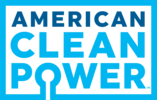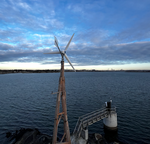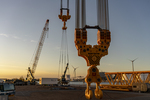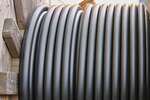News Release from American Clean Power Association (ACP)
Wind Industry Profile of
07/20/2011
AWEA - Energy policy tops list of needs at wind energy manufacturing conference
A consistent and supportive national energy policy is needed to enable U.S. wind power manufacturing to grow, attract investment, and create jobs, according to speakers at a conference currently underway in Cleveland.
Some of the speakers and their comments, as reported by the Cleveland Plain Dealer:
- Terence Stewart, a Washington, D.C.-based attorney, whose law firm complained to the World Trade Organization about Chinese subsidies and preferences for domestic turbines and components as opposed to imports, said it's clear that China is strongly supporting renewable energy. By contrast, the most important U.S. policy encouraging wind power, the federal wind energy production tax credit (PTC), will expire at the end of 2012.
- AWEA Senior Vice President of Public Policy Rob Gramlich, who pointed to dramatic slowdowns in the U.S. wind farm industry that occurred when the PTC was allowed to expire in the past. According to Gramlich, "The natural state is to produce [wind turbine components] here. When that doesn't happen, it's the sign of a broken market. The intermittent tax credit is the source of all kinds of problems. And that policy instability and market instability is why companies have a lot of risk if they invest in long-term prediction of the supply chain."
- Matthew Carr, a strategic procurement manager for Japanese wind turbine maker Mitsubishi, who said his company is building a factory in Arkansas and is seeking domestic component suppliers. It's not an easy problem, he said, because European and Asian companies currently have a technological edge. Carr blamed "de-industrialization of the USA," adding, "This has been ongoing since the 1970s. Heavy industry, large scale manufacturing is drying up in this country. As an American, I find this very troubling."
As we have noted here before, the U.S. needs consistent long-term policies that will lay a foundation for long-term growth in clean energy manufacturing and allow the wind energy industry to build on its successes of the past several years, during which there has been a 12-fold increase in domestic manufacturing of wind turbines and their components.
For more information on this article or if you would like to know more about what www.windfair.net can offer, please do not hesitate to contact Trevor Sievert at ts@windfair.net
www.windfair.net is the largest international B2B Internet platform – ultimately designed for connecting wind energy enthusiasts and companies across the globe!
Some of the speakers and their comments, as reported by the Cleveland Plain Dealer:
- Terence Stewart, a Washington, D.C.-based attorney, whose law firm complained to the World Trade Organization about Chinese subsidies and preferences for domestic turbines and components as opposed to imports, said it's clear that China is strongly supporting renewable energy. By contrast, the most important U.S. policy encouraging wind power, the federal wind energy production tax credit (PTC), will expire at the end of 2012.
- AWEA Senior Vice President of Public Policy Rob Gramlich, who pointed to dramatic slowdowns in the U.S. wind farm industry that occurred when the PTC was allowed to expire in the past. According to Gramlich, "The natural state is to produce [wind turbine components] here. When that doesn't happen, it's the sign of a broken market. The intermittent tax credit is the source of all kinds of problems. And that policy instability and market instability is why companies have a lot of risk if they invest in long-term prediction of the supply chain."
- Matthew Carr, a strategic procurement manager for Japanese wind turbine maker Mitsubishi, who said his company is building a factory in Arkansas and is seeking domestic component suppliers. It's not an easy problem, he said, because European and Asian companies currently have a technological edge. Carr blamed "de-industrialization of the USA," adding, "This has been ongoing since the 1970s. Heavy industry, large scale manufacturing is drying up in this country. As an American, I find this very troubling."
As we have noted here before, the U.S. needs consistent long-term policies that will lay a foundation for long-term growth in clean energy manufacturing and allow the wind energy industry to build on its successes of the past several years, during which there has been a 12-fold increase in domestic manufacturing of wind turbines and their components.
For more information on this article or if you would like to know more about what www.windfair.net can offer, please do not hesitate to contact Trevor Sievert at ts@windfair.net
www.windfair.net is the largest international B2B Internet platform – ultimately designed for connecting wind energy enthusiasts and companies across the globe!
- Source:
- American Wind Energy Association / www.awea.org/blog/
- Author:
- Posted by Trevor Sievert, Online Editorial Journalist / By Tom Gray
- Email:
- windmail@awea.org
- Link:
- www.awea.org/...
- Keywords:
- awea, wind, wind energy, wind turbine, rotorblade, awea, ewea, wind power, suppliers, manufacturers, renewable energy, trevor sievert



























